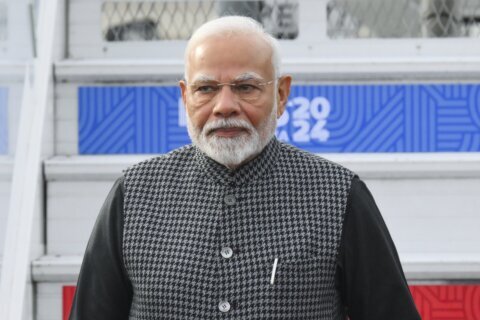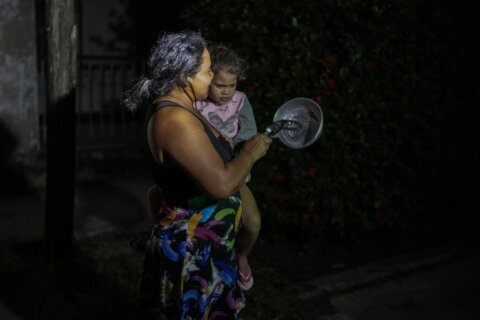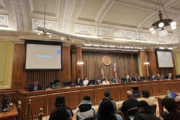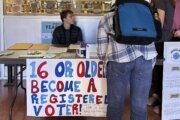For Isis Vrolijks, the opportunity to play field hockey at Longwood University in Virginia has been a once in a lifetime experience. Having moved to the United States from the Netherlands two years ago, Vrolijks says she now feels like she’s found her second home.
“The atmosphere of being on a college campus is amazing, and being a part of the team I’m a part of right now is the best,” says Vrolijks, a criminal justice major. “I have made really good friends over here, and all of their families are really open and sweet to international students.”
There are more than 20,000 international student-athletes enrolled and competing at National Collegiate Athletic Association schools. The NCAA is a nonprofit organization in the U.S. that regulates and administers intercollegiate athletics.
“Every young athlete knows that to perform at your best you need to be in the U.S. collegiate system,” says Munya Maraire, a Zimbabwe-born former Pennsylvania State University sprinter and football player, and CEO of World Wide Scholarships, which places African athletes with American colleges and sporting organizations.
Playing sports at a U.S. school can bring greater exposure and opportunity, but there are also some important visa-related restrictions for international student-athletes to keep in mind. Here are three things prospective international student-athletes should know when planning to attend a U.S. college or university.
[Read: 3 Tips for International Student-Athletes.]
There are opportunities to grow your following.
International student-athletes can gain a large following by being on nationally known college teams, administrators say.
“We are a very high-profile athletics program that sponsors over 20 sports,” says Matthew Banker, associate athletic director for the University of Louisville in Kentucky. “We also have a very expansive and loyal fan base not just here in Louisville but around the country and around the globe.”
The university is nationally ranked in many sports, and Banker says the opportunity to compete in Division I of the NCAA “breeds success and more positive exposure for our student-athletes.” The school helps the student-athletes in all facets of their college experience, he adds, including with branding and social media development.
At Ohio State University, student-athletes get professional social media assessments to improve their profiles and increase their number of followers, says Carey Hoyt, senior associate athletic director of sport administration and student-athlete development there.
“They are given data to show when their posts perform the best and when their fans are most likely to engage with their posts,” Hoyt says. “Additionally, they have access to athlete brand experts and online learning modules.”
Vrolijks says she has already gained a lot of followers on her social media platforms and also gets help from KingsTalent, a sports recruiting agency that helped her come to the U.S.
“This agency reposts everything related to my field hockey and experience in America, which results in me gaining followers from their account and girls who play field hockey in the Netherlands,” Vrolijks says.
[Explore a sample international student college budget.]
Compensation for NIL could put your visa at risk.
In 2021, the NCAA changed its rules to allow student-athletes to receive compensation for the use of their name, image or likeness (known as “NIL”). But international students may not be able to take advantage of the shift.
“The NCAA’s interim NIL policy does not prohibit international student-athletes from engaging in NIL opportunities,” says Saquandra Heath, an NCAA spokesperson. But because of student visa requirements, getting paid for things like personal appearances, autographs, private coaching or endorsing products could potentially put an international student’s visa at risk.
Immigration attorney Raymond G. Lahoud, who chairs the immigration practice group at the firm Norris McLaughlin, says international students make up about 12% of all college athletes, with over 3,000 playing on Division I teams.
“Most of these students are in the United States under an F-1 student visa, which is quite restrictive in that it does not permit a student to work in the United States,” says Lahoud. “When it comes to the NCAA’s NIL legislation, international student-athletes on F-1 visas must remain as passive as possible when in the United States. Students should just play the sport in the United States and nothing more.”
Banker says UofL Athletics is advising international student-athletes “to be cautious about pursuing NIL opportunities due to employment restrictions applicable to their student visas.”
But Vrolijks says she believes in equal treatment for all student-athletes.
“Every student-athlete should be allowed to turn a profit off their likeness, international students included. I think this is fair because international students work as hard as any other student athlete from America,” says Vrolijks.
The absence of NIL opportunities for international student-athletes hinders equity and inclusion, says Ancia Ifill, associate director of academic services for UofL Athletics and a former junior tennis player from Barbados who received a tennis scholarship from Bethune-Cookman University in Florida. “It is time for key stakeholders to emphasize the need for equity and inclusion at all levels.”
For its part, the federal Student and Exchange Visitor Program is currently assessing the issue of NIL compensation for international student-athletes and whether regulatory guidance may be required, says Britney L. Walker, a spokesperson with U.S. Immigration and Customs Enforcement at the Department of Homeland Security.
[Learn about ways international students can weigh potential majors.]
Compensation opportunities may exist in your home country.
While international student-athletes may not be able to take advantage of NIL opportunities in the U.S., they could still benefit when back at home.
“When advising international students on the NCAA’s NIL legislation, I remind them that it is perfectly lawful to travel home for summer, spring and winter breaks to participate in NIL activities,” says Lahoud. “When an international student-athlete is in their home country and performs services, the athlete may receive compensation from a U.S. company, or, for that matter, any other company, without regard to violating U.S. immigration law.”
Likewise, Banker says UofL’s International Student and Scholar Services staff have advised that an international student-athlete could pursue NIL opportunities when they are in their own country, such as an in-store appearance “that would never overlap when using the student visa.”
Banker advises international student-athletes at UofL to always consult with the university’s office for international students first.
Vrolijks says she is currently not pursuing any opportunities for compensation in her country. And that while being an international student-athlete is hard work, she believes the experience makes it worth it in the end.
“What I would say to other international student-athletes that are planning to come to the U.S., if you have the opportunity to do so, definitely come,” says Vrolijks.
More from U.S. News
Declining International Student Numbers Stabilize
What to Research About Online Universities in the U.S.
A Guide to Scholarships for International Students
3 Things International Student-Athletes Should Know originally appeared on usnews.com







